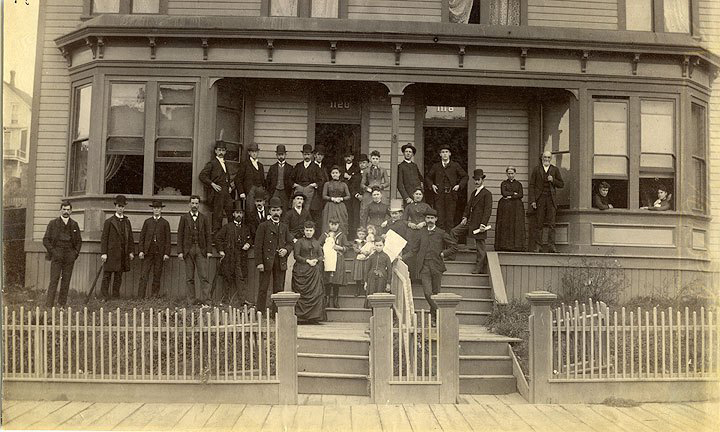- Navigator
- Featured Indicator
- Workforce Development
The United States was built in large part by immigrants and immigration continues to play a significant role in the economic development and prosperity of this country, contributing to the growth and vitality of communities across the nation. The diverse skills and experiences brought by immigrants, along with an entrepreneurial spirit, drive innovation while boosting productivity and expanding markets.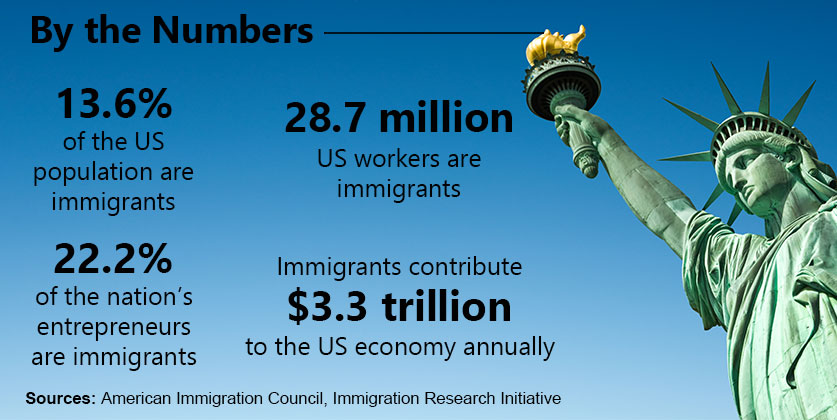
Evidence cited by Forbes also illustrates how immigrants stimulate business entry and expansion while promoting economic growth through their willingness to relocate to areas where businesses are forming or expanding and need more workers. Contributions of immigrants span a wide variety of economic sectors and have far-reaching impacts, and maximizing these contributions means that economic developers must understand the role immigrants play in their local community.
To help with this, the American Immigration Council has consolidated immigration data from a wide range of sources and provides easy access to it through its Map the Impact tool. This online data tool includes detailed immigration information at the national, state, county, Metropolitan Statistical Area, and congressional district levels, allowing for a deeper understanding of the influence and contributions that immigrants offer.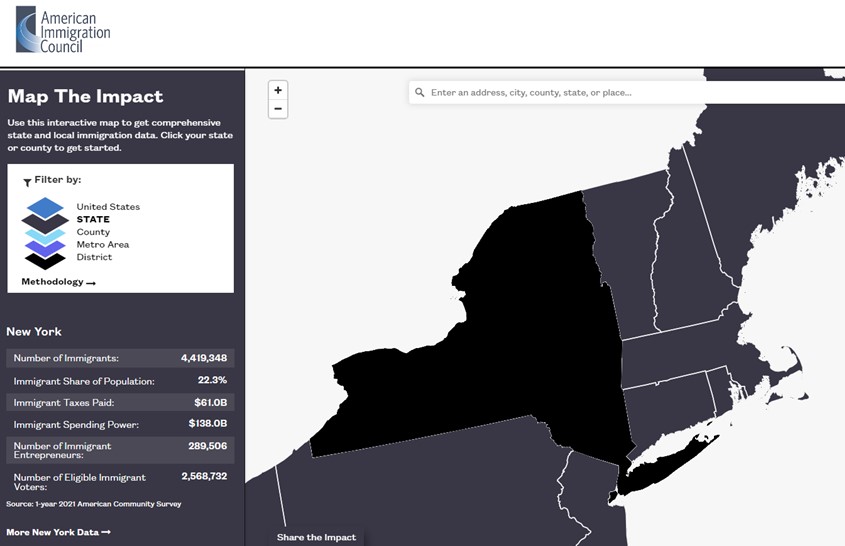
Drilling down to the most detailed levels, the Map the Impact tool provides information on demographics, workforce (including educational attainment and industry concentrations), home ownership, spending, taxes paid, levels of entrepreneurship, and more.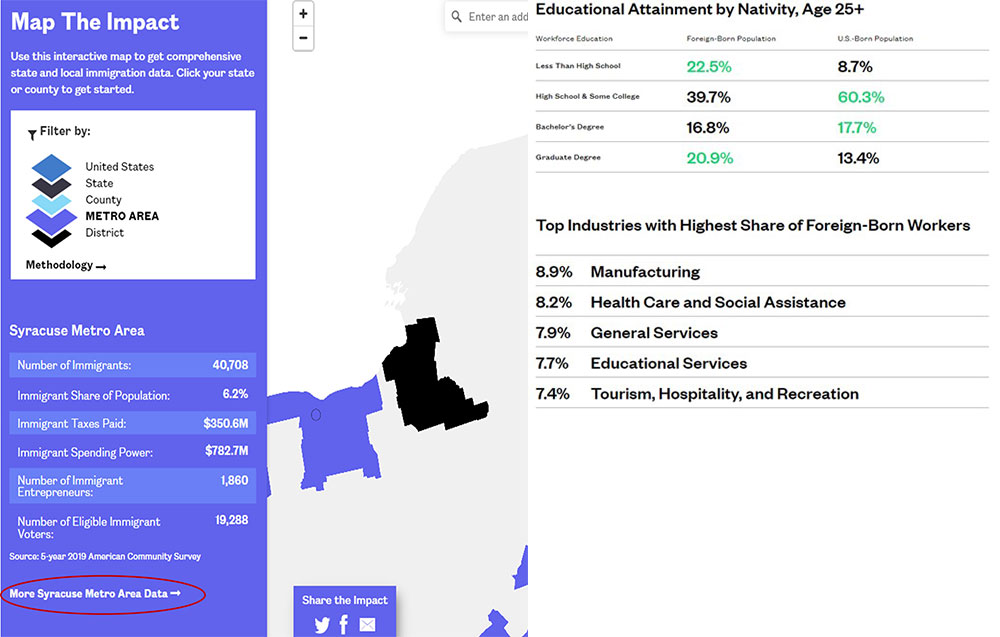
What the Data is Telling Us
More Immigrants are Working Age: At the national level, the Map the Impact tool shows the portion of working-age immigrants (age 16 to 64) stands at 78% as compared to just 61% of the US-born population. It also reports a total of 3.5 million immigrant entrepreneurs in the US, generating annual business income of $95.6 billion.
Immigrants Have a Wide Range of Education Levels: Accounting for 17.1% of the total workforce, over one-quarter of immigrant workers (25.6%) have not completed the equivalent of high school (compared to 7.4% of the native-born workforce). At the same time, a greater share of immigrant workers hold graduate degrees (15.2%) than do US-born workers (13.5%).
These wide-ranging levels of educational attainment help explain the high concentration of immigrants in personal services occupations that often don’t require specific degrees such as manicurists (75%), agricultural workers (58%), and construction including masons (56%) and drywall installers (53%), while simultaneously accounting for 23% of STEM workers in jobs that often require advanced degrees. The dashboard also reports immigrants making up 15% of US nurses, and 26% of health aides, which often require degrees and certifications.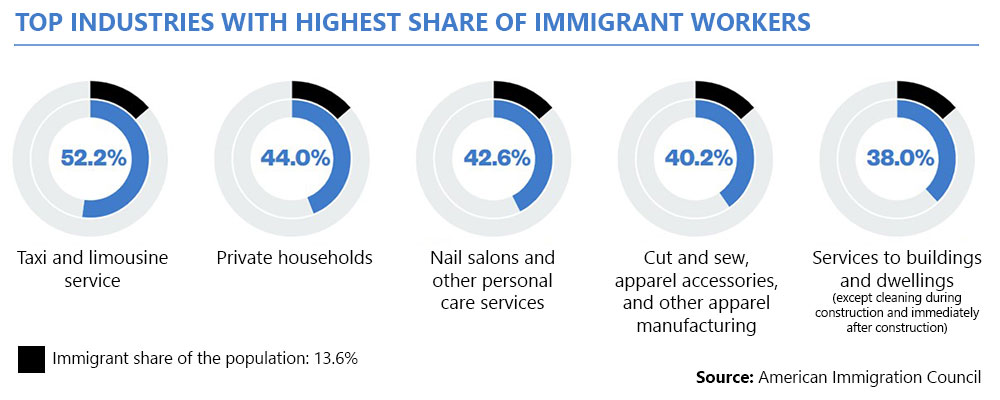
Immigrants Support the Economy: The tool also reports on immigrant’s role as consumers with $1.4 trillion in annual spending power. What’s more, a full 10.9 million immigrants are homeowners with total housing wealth measuring $5.4 trillion. In addition, the 948,000 international students attending US colleges and universities boost spending by $33.3 billion each year, supporting 335,000 jobs.
Why is Immigration Data Important?
Awareness of the local immigrant workforce remains vital to economic development professionals who seek to understand and guide labor force skill sets and availability. Economic development organizations need to accurately assess the local immigration landscape in terms of their current and future labor market needs and develop strategies to attract, retain, and upskill immigrant workers.
Immigrants are often drivers of entrepreneurship and innovation, bringing new ideas, perspectives, and cultural capital to the economy. Economic development organizations can also encourage immigrant entrepreneurship by providing support services, access to capital, and networking opportunities specific to these communities.
Engagement with immigrant communities can become part of the toolbox used to revitalize neighborhoods, boost local businesses, and enhance the cultural fabric of a region. This involves both state and municipal agencies supporting immigrant-led community development initiatives to promote economic growth and social cohesion.
As immigrants often maintain strong ties to their countries of origin, opportunities to facilitate international trade and investment are enhanced through close partnerships with immigrant communities. Economic development agencies can leverage these connections to attract foreign businesses and expand market access for local companies.
Accurate data on immigration levels as provided by the Map the Impact tool informs evidence-based policymaking. Armed with this knowledge, fully informed economic development organizations can advocate for policies that best support immigrant integration, workforce development, and business expansion among all communities, promoting overall economic growth, social inclusion, and well-being. By leveraging the contributions of immigrant communities, economic development organizations in turn foster a thriving and inclusive economy for all.
Other ways economic developers can include immigrants in public policymaking, workforce development, and strategic planning efforts include:
- Providing language and skills training to help immigrants integrate into the workforce and contribute to their full potential
- Offering access to capital, mentorship, and business development resources that empower immigrant entrepreneurs to start and grow their businesses
- Fostering community engagement and cultural sensitivity to promote understanding and collaboration between immigrant and US-born communities
Immigrants are an integral part of the economic fabric of our society and an invaluable workforce and entrepreneurship assets to local communities and the nation. With support from economic developers, immigrants can continue to drive growth, innovation, and diversity within their local communities and beyond.
Camoin Associates is a national leader in using research and data analysis to help communities and organizations understand where they are now and develop actionable, equitable economic and workforce development goals designed to get them where they want to be. Learn more about our services.



